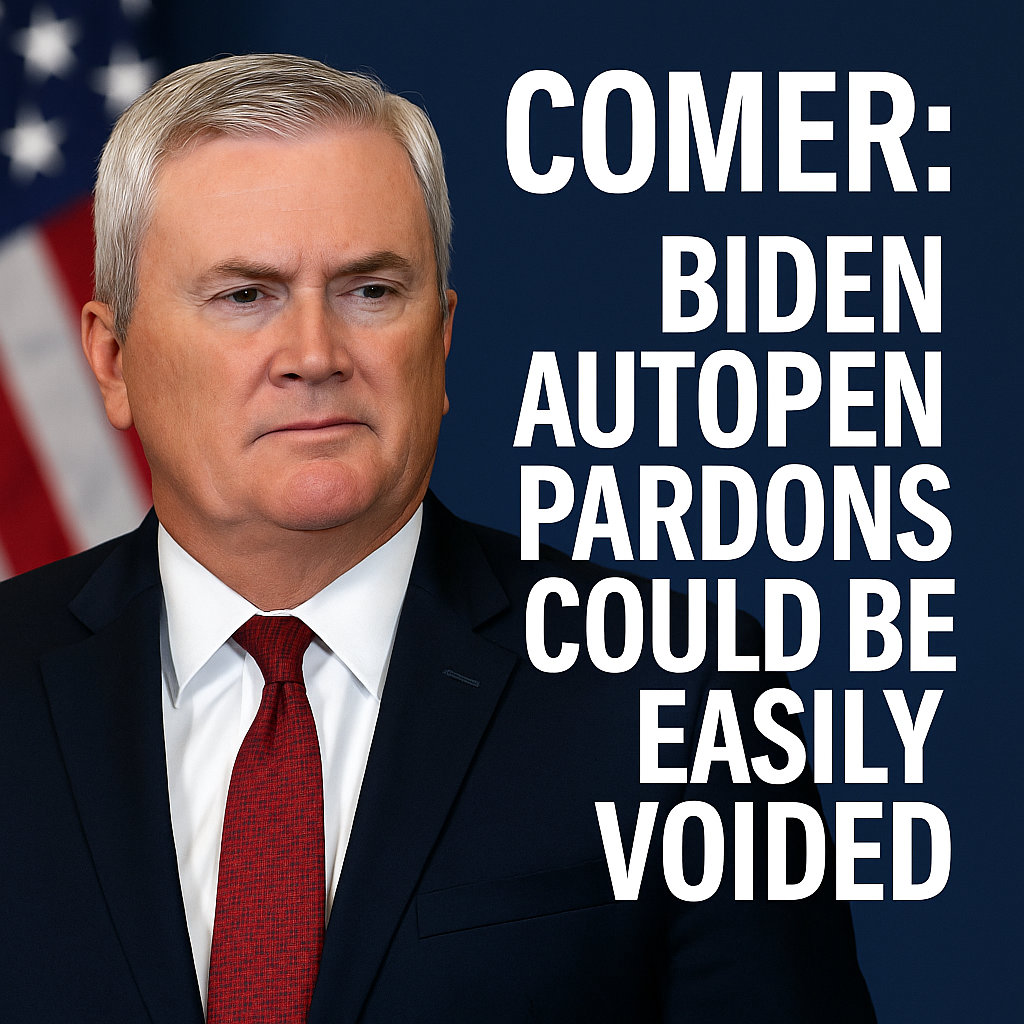House Oversight Committee Chairman James Comer has raised sharp concerns about President Joe Biden’s use of the autopen to sign presidential pardons, warning that such actions could be easily voided under constitutional scrutiny.
The Kentucky Republican suggested that if Biden himself did not physically sign the documents, the legal standing of those pardons may collapse.
Comer’s remarks came during an interview in which he emphasized the constitutional requirement for the president to personally execute certain duties that cannot be delegated to a staffer or machine. He argued that the power of the pardon, a direct provision of Article II of the Constitution, rests solely in the president’s hand and signature.
The issue has gained national attention after reports that Biden relied on the autopen—a mechanical device that reproduces his signature—to grant pardons in recent months. While the autopen has been used historically for routine correspondence and some executive matters, applying it to presidential pardons has stirred significant debate.
Critics argue that delegating such a solemn constitutional responsibility to a machine not only undermines the integrity of the pardon process but also creates serious legal vulnerabilities. Comer stressed that these pardons could be challenged and potentially nullified, as courts may determine that the president did not fulfill his personal obligation in granting them.
“The pardon power is one of the clearest constitutional duties assigned directly to the president,” Comer stated. “If a machine, rather than the president, carries out that action, then the pardon is constitutionally defective and could be considered invalid.”
Trending: Fauci Emails: ‘Delete After Reading’ Bombshell Emerges
Supporters of Biden have downplayed the controversy, suggesting that the autopen functions merely as an extension of the president’s authority, used with his approval. Yet Comer dismissed that argument, noting that the Constitution makes no allowance for mechanical delegation in matters of criminal justice mercy.
The implications of this issue extend far beyond mere symbolism. If Comer’s interpretation gains traction, individuals who received pardons through the autopen could find themselves thrust back into legal jeopardy. Courts would likely be compelled to revisit the legitimacy of those pardons, potentially reopening criminal liabilities for the affected individuals.
The debate also underscores growing concerns about Biden’s fitness and level of engagement in his constitutional role. Comer and other Republicans have repeatedly pointed to Biden’s reliance on staff and mechanical aids as evidence of a presidency increasingly detached from its responsibilities. They argue that the commander-in-chief’s inability or unwillingness to personally perform his constitutional duties raises red flags about his competency.
From a conservative perspective, the matter also highlights a broader pattern of executive overreach and disregard for constitutional limits. Critics argue that Democrats often treat the Constitution as a flexible document to be bent or stretched to fit political objectives, while ignoring its plain meaning and intent. The use of the autopen in issuing pardons, they contend, is just another example of this troubling trend.
For Christians who view government authority through the lens of biblical teaching, the issue is also morally significant. Romans 13 teaches that rulers are servants of God, entrusted with authority to execute justice. That solemn responsibility cannot be treated casually or outsourced to mechanical shortcuts. Mercy and justice demand a personal, deliberate act, not a rubber-stamped signature produced by a device.
If Comer’s warnings prove correct, the fallout could be historic. Pardons are among the most consequential presidential acts, often touching the lives of individuals, families, and entire communities. To have such decisions voided because of constitutional shortcuts would create political and legal chaos. It would also further erode public confidence in the presidency at a time when trust in government is already dangerously low.
My own view is that Comer is right to press this issue. The Constitution assigns the pardon power exclusively to the president, and for good reason. It is one of the most personal expressions of executive authority. A pardon is not a memo or a Christmas card; it is a life-changing act of mercy and justice. Allowing it to be executed by an autopen diminishes both the seriousness of the act and the office itself.
Furthermore, it reflects poorly on Biden’s leadership that such a controversy has even arisen. A president who is truly engaged and capable should have no difficulty signing pardons himself. The fact that Biden is relying on a machine for such duties suggests either a lack of energy or a lack of respect for the constitutional role he occupies. Neither explanation is acceptable.
As this story develops, Americans should demand clarity. Were pardons actually signed by Biden’s hand, or were they produced by an autopen? If it is the latter, then legal challenges are not only likely—they are necessary. Upholding the Constitution requires no less.
Keywords: James Comer – Biden autopen pardons – presidential authority – constitutional limits – invalid pardons – House Oversight Committee – executive overreach – Biden fitness – Christian worldview – separation of powers






